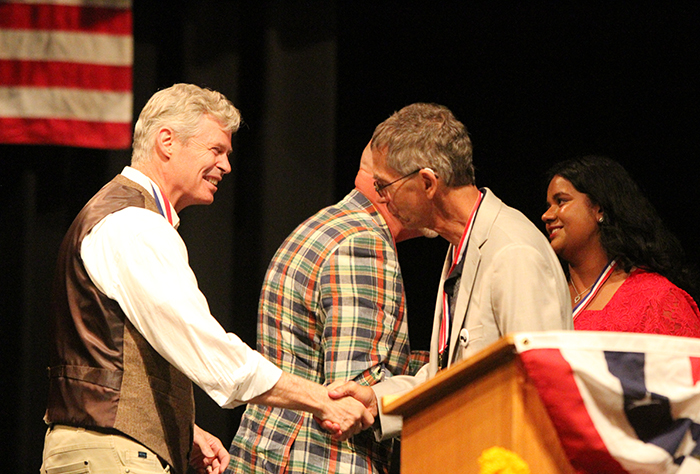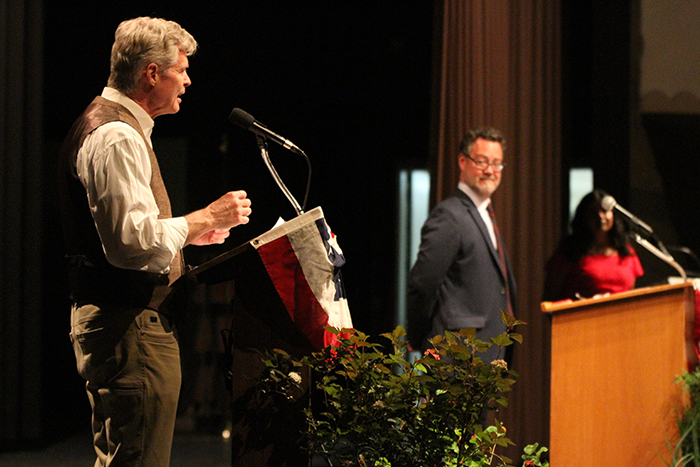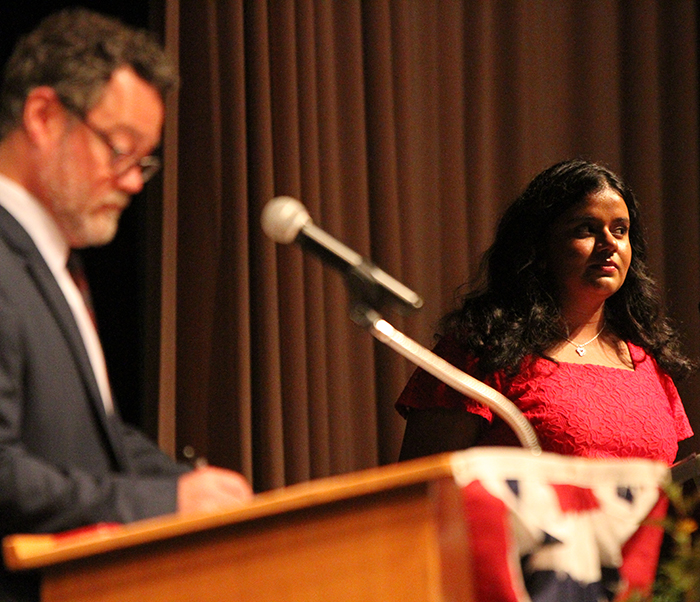Lose wins 32nd annual Great American Think-Off
News | Published on June 17, 2025 at 4:10pm GMT+0000 | Author: Tucker Henderson
0Eden Prairie pastor contended there is more than one truth

Pastor David Lose was congratulated by fellow Great American Think-Off semi-finalist David Eckel after being crowned as America’s Greatest Thinker on Saturday night.
By Chad Koenen
Publisher
Pastor David Lose, who is from Eden Prairie, Minn., won the 32nd annual Great American Think-Off by arguing there is more than one truth. A large crowd gathered at the New York Mills School auditorium to decide whether there is only one truth, or there are many truths, during the annual think-off.

Pastor David Lose defeated Pavithra Krishnan in the 32nd annual Great American Think-Off on Saturday night at the New York Mills School auditorium.
In the finals, Lose said it is important to recognize that not all truths can be proven scientifically as a person’s truth can be shaped by their experiences.
“No, not all truths can be proven scientifically. I think that fact/value split can be important,” said Lose.
In his closing statement Lose said people can have a different truth that can be right to them, given a person’s experience.
“I would love it if we could all live our truth and not just try to prove it,” he said.

Lose squared off in the finals against Pavithra Krishnan, a college student from Troy, Mich., who contended there was only one truth.
In her closing statement, Krishnan said when people start treating beliefs as truth, emotions get elevated and it is important to separate beliefs from factual truth.
“I do think there is one truth out there and I think people can believe whatever they want, but that doesn’t change the fact there is one truth out there,” said Krishnan.

In the opening round of the night Krishnan defeated David Eckel, a retiree from Clayton, N.C. Both participants argued that there was only one truth.
In making his argument that there was only one truth, Eckel relied on the forest near his home as an example of how no two people would likely view a forest the same way.
“We interpret what we sense in a prism of prior experience,” he said.
He went on to say that he found it more reasonable that a single forest is perceived in 50,000 different ways than as just one truth and people need to keep an open mind about the truth of other people.
Krishnan relied on math and science to show that human perception is faulty, yet truth cannot change. She went to say there is only one truth, but knowledge can change since it is often incomplete.
“The truth is out there, even if it is beyond our reach,” she said.
She said if the truth is something that stands beyond perception, then the question should be do people ever get to the absolute truth.
“If one person says the world is round and the other says the other is flat, one person is wrong (no matter how much they feel they are right),” she said.
In the second round Lose defeated Jay Sieling, who is a retired educator from Miltona, Minn., by arguing there are many truths.
Sieling said there are as many truths as there are stories and shared that his grandson told him truth is real and false is not real. He continued that everyone may have their own truth based on their own experiences.
“I know there are many truths. Some 40 years ago I wrote a final paper for an intro to philosophy course that argued for one truth,” he said.
He said the paper talked about a John Sax poem of six different blind people touching an elephant and asked to describe what they felt. Each person described something different, which they all believed to be true based on their own experience, but false since they were unknowingly touching an elephant.
“Each person’s account is true based on their experience and senses, but each is wrong or not complete and each is objectively wrong because there is an elephant and they didn’t know it.”
Lose argued that truth is not the same as facts. He said there are facts like how to turn on a light or a vehicle, but facts may not tell the whole story about things like the real reason the Civil War started in the first place.
“Truth is not the same as fact, certainly there is a dimension of factual truth…that we depend upon for a myriad of activities from turning on our lights and our cars,” he said. “We may agree, for instance, for the historical factors on the start of the Civil War…but what did the war mean? Facts alone may not answer that question.”
He also said truth can be affirmed in conversation with others as “our sense of truth changes and grows.”

